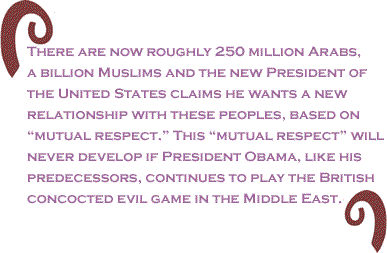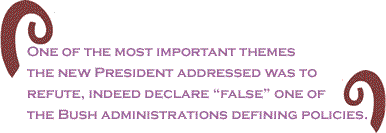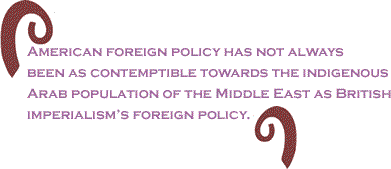
|
|||||||||||||||||||||||

|
|

Custom Search
|
|
 |
|
Regarding al-Qaeda, he didn’t exactly put it that way but a closer reading and a more honestly keen interpretation inevitably leads those of us sympathetic towards a sincere anti-imperialist tradition to logically infer and quite inevitably draw that conclusion. The comparison and then verdict is clearly implicit and what more noble platform to affirm this absolute truth, than at his own inauguration, as President of the United States of America: one of the first nations, if not the first nation to free itself from the British parasitic and imperialist yoke. History testifies that if the American revolutionaries had not liberated themselves from the British they simply would not have become the technologically pioneering and culturally dominant nation of the last 100 years. China, India and Iran are now showing similar patterns of progress. The fascinating progress of all the three nations is predicated on the uncompromising fact that they freed themselves from imperialist and neo-imperialist bondage. It is very unlikely that China will ever suffer from British imperialist opium dealers backed by the British Navy again. [1] Since Indian independence, the Indians have not been inflicted by any famine caused by British imperialist looting and pillaging of their staple resources. [2] But what did President Barack Hussain Obama really say at his magnificent inauguration. One of the most important themes the new President addressed was to refute, indeed declare “false” one of the Bush administrations defining policies. That is, there is clash between, “safety” and “ideals”. President Obama indirectly asks why the safety/ideals dichotomy was not expediently utilised during the founding moments and battles of the new republic. Furthermore, not only was this dichotomy not utilised for political expediency’s sake but a charter was drafted “to assure the rule of law and rights of man.” President Obama categorically states, that the “enemy”, i.e. the British Empire, during the war of independence was more perilous – actually, “perils we can scarcely imagine” – than a “network of violence and hatred” i.e. al-Qaeda. [3] The British Empire was more perilous than al-Qaeda. Or in other words, if the United States did not compromise its ideals when they were facing the British enemy which wanted to destroy their revolution, their ideals and bring to an end the fledgling republic, then why should they compromise their values when faced with al-Qaeda? Whereas, British imperialism initially waged war on the United States, on American soil so as to prevent the development of the new republic and also eventually invaded and burned down the capital as it was retreating, al-Qaeda’s attacks on the United States and American interests are very much largely a response to American foreign policy. As the main leader of al-Qaeda, Osama bin Laden, has said, why hasn’t he attacked Sweden? If American values, such as freedom, are what antagonise al-Qaeda, why isn’t al-Qaeda attacking other nations, such as Sweden, which share those values? [4] American foreign policy has not always been as contemptible towards the indigenous Arab population of the Middle East as British imperialism’s foreign policy. Before the Eisenhower doctrine of 1957, America didn’t always see the Middle East through British foreign policy eyes.
British officials during and immediately after the Second World War worked very hard and launched an academic propaganda campaign in order to convince the United States to acknowledge Soviet Russia as the new enemy. Once this acknowledgement was established, the United Kingdom easily sold its design of and for the Middle East as a bulwark against Soviet Russia and communism. [5] However, before this was fully established there were two episodes wherein the United States seemed to be in political sync with the now indigenous Arab population of the Middle East. The first episode was the King-Crane commission in 1919. The commission was devised by President Wilson after the Great War to find and report on what the local populations of the Middle East wanted in its aftermath. They visited at least 1500 locations in what was then known as the ‘Shaam’ region amongst the indigenous population. [6] This region now covers Israel/Palestine, Jordan, Lebanon and Syria. It was found that, after the commission’s remit had been reduced so as not to partly offend the British, the indigenous population wanted nothing to do with British mandates, the Balfour Declaration and Britain’s project of facilitating a European Jewish majority in Palestine. [7] The second episode was when America compelled the British led tripartite invasion of Egypt in 1956 to stop. This British led imperialist adventure is now commonly referred to as the “Suez Crises”. According to the historian Keith Kyle, there is evidence that America having won popularity and credibility amongst the vast majority of mankind by preventing British barbarism from going further could have chosen to side with Third World anti-imperialists. Instead it continued to perceive the world through British eyes and eventually reaped its wrath. [8]
One of the other reasons why America reaps Arab and/or Muslim wrath which has emanated from unquestioningly inheriting British designs is because British so-called anti-imperialists, dissidents and left wingers find it much easier to criticise American imperialism. As such, they ‘direct dissent’ towards American foreign policy rather than British foreign policy. For example, at the time of the American war on Vietnam, Great Britain was actively engaged in supporting pro-imperialist reactionaries in North Yemen and Oman, yet the British establishment left, found it more convenient to march against the American war on Vietnam. We witnessed this highly convenient strategy again during the Iraq War 2003, when leaders of the British anti-war movement falsely and without one piece of evidence blamed America for Britain’s co-invasion of Iraq, rather than its own economic interests or imperialist traditions. [9] As an adjunct to his inauguration, in his first interview with a foreign television station, the new President reiterated America’s liberation from British imperialism. He correctly stated that, “America was not born a colonial power.” [10] This may be seen as a much belated swipe at America’s former imperial master and the Middle East’s original architects of division, exploitation, terror and war - the British. Britain, to a very large extent, has always defined itself by colonialism and imperialism. To this day, a statue of one of its greatest imperial looters, Robert Clive stands outside the British foreign and commonwealth office in London, no doubt, signalling its intent towards mankind. There are now roughly 250 million Arabs, a billion Muslims and the new President of the United States claims he wants a new relationship with these peoples, based on “mutual respect.” This “mutual respect” will never develop if President Obama, like his predecessors, continues to play the British concocted evil game in the Middle East. A barbaric game, which has reaped millions and billions in subsidies [11] for the British state (under the fig leaf of “investments” and “trade” from the Gulf statelets it created), fanatical murderous wrath for the Americans and ethnic cleansing, division and war for the indigenous Arabs. BlackCommentator.com Guest Commentator, Nu'man Abd al-Wahid, is a UK-based freelance writer (of Yemeni origin) who specializes in the political relationship between the British state and the Arab World. His focus is on how Britain has historically maintained its interests in the Arab World and the Middle East. Click here to contcact Mr. Abd al-Wahid. [1] John Newsinger, The Blood Never Dried, London, Bookmarks Publications, 2006, pg48-64. [2] Mile Davis, Late Victorian Holocausts, London, Verso, 2001. [3] Barack Hussain Obama, “The inaugural address” Independent, 21st January 2009. [4] Osama bin Laden, “Your security is in your own hands”, CNN transcript, 29th October 2004. http://edition.cnn.com/2004/WORLD/meast/10/29/bin.laden.transcript (accessed on 5th February 2009). [5] William Roger Louis, Imperialism at Bay, Oxford, Clarendon Press, 1977, pg.3-27. [6] The geographical area ‘Shaam’ in the carve-up known as the Sykes-Picot agreement, was divided by Britain into Palestine, Lebanon and Syria. After the 1922, Winston Churchill created Trans-Jordan (now Jordan) with a view to resettle ethnically cleansed Palestinians once Britain had facilitated the establishment of a Jewish majority in west Palestine. [7] Ilan Pappe, Clusters of history: US involvement in the Palestine question”, Race and Class, Volume 48, No. 3, Jan. – March 2007, pg 1 – 28. [8] Keith Kyle, Suez, London, Weidenfield & Nicolson, 1991, pg.526-527 [9] John Newsinger, ‘When old Labour went to War’, International Socialism Journal, Spring 2008, Issue 118. http://www.isj.org.uk/index.php4?id=427&issue=118 (accessed 5th February 2009). See also my, ‘Thus Spoke George W. Bush.’, karmalised.com, 15th January 2009. http://karmalised.com/?p=5929 (accessed 5th February 2009). [10] Barack Hussain Obama, ‘Obama Al-Arabiyya Interview: Full Text’, The Huffington Post, 26th January 2009. http://www.huffingtonpost.com/2009/01/26/obama-al-arabiya-intervie_n_161127.html (accessed on 5th February 2009). [11] During the war on terror Britain has been in receipt of massive “investments” from the Gulf statelets and Saudia Arabia. Oil revenue has been pummeled into BAE, Eurofighter, Sainsbury’s, Barclay’s, London Stock Exchange, Soccer teams and stadiums, Eco-energy, amongst many others and at least 200,000 British workers/ex-pats are in the Gulf are earning tax-free incomes. However, the British left is naturally fixated with Haliburton and Starbucks. A full study of the current British economic dependence on Arab oil is not known to the author. |
|
Any BlackCommentator.com article may be re-printed so long as it is re-printed in its entirety and full credit given to the author and www.BlackCommentator.com. If the re-print is on the Internet we additionally request a link back to the original piece on our Website. Your comments are always welcome. eMail re-print notice
If you send us an eMail message we may publish all or part of it, unless you tell us it is not for publication. You may also request that we withhold your name. Thank you very much for your readership. |
|
| |
|
| February
19, 2009 Issue 312 |
|
| Executive Editor: Bill Fletcher, Jr. |
| Managing Editor: Nancy Littlefield |
| Publisher: Peter Gamble |
| Est. April 5, 2002 |
Printer Friendly Version
in resizeable plain
text format or pdf
format. |
| Frequently Asked Questions |
 |

|
 |
 |
 |
| |
| |







































